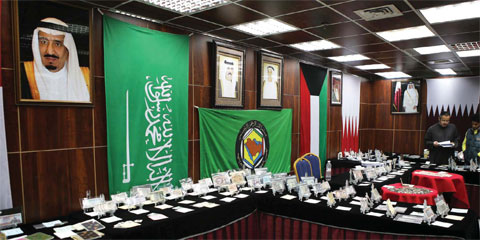 Collecting coins is a popular hobby worldwide, and numismatists build their collections by buying coins from other collectors, antique stores or auctions. There are many collectors in Kuwait too, and regular auctions are held, including the most recent one in December at the Heritage Mall (Mujama' Al Turath) in Mubarakiya.
Collecting coins is a popular hobby worldwide, and numismatists build their collections by buying coins from other collectors, antique stores or auctions. There are many collectors in Kuwait too, and regular auctions are held, including the most recent one in December at the Heritage Mall (Mujama' Al Turath) in Mubarakiya.
Basim Mohammed Al-Ibrahim, owner of the Old Currency Center at the mall, explained that this auction was the seventeenth one held in 2015, and was the biggest auction for currency in Kuwait. "This auction included both coins and banknotes. It included 170 batches, which may include from one item up to 30 items, and are always sold in one transaction. The next, the 18th currency auction, will be held on January 29, 2016. This mall has been operating for more than one year. Every month we hold one or two auctions," he told Kuwait Times.
Before accepting currencies, both coins and banknotes, Ibrahim examines and evaluates them. "When a seller comes to submit his items to be sold at the auction, I examine them to determine if they are authentic or not, and I also evaluate their value as I'm an expert. Then I prepare a list with the participating items in the auction. According to this list, we know how many and which items were sold. We also set minimum bids. When the currency is registered in the list, we provide a short description about it, and interested people can get a copy of this list. Then we set the date and time of the auction," he added.
The auction is usually very well attended. "Many people are interested in these auctions, and we have participants even from other countries. The number differs at each auction, but it's usually between 40 to 80 people. Some of them are collectors who practice it as a hobby, while others profit from it as it's a business for them. Some customers attend and buy personally, while others have brokers to do deals on their behalf," explained Ibrahim.
The currency auction is not the only auction held at the Heritage Mall. "There are 80 shops in this mall selling various valuable items that have collectors. There are stores dealing in antiques, currencies, precious stones and others. So there are auctions for antiques, books and magazines and others. There is a special hall in this mall where we hold these auctions, and it's a perfect place for such activities as it lies in the heart of the commercial area, which is much better than when some auctions were held in private halls in houses and neighbors were complaining. Through this activity we aim to add activities to Kuwait as it attracts many tourists, as we also seek heritage sites or traditional bazaars when we travel," Ibrahim pointed out.
There are no conditions on currencies that can be sold in this auction. "If a currency is available in the market, then we will not accept it. It has to be either rare or somehow special. It's not necessary to be historical or out of circulation - for instance the currency of South Africa can participate as it's not available in Kuwait. Also, we can accept a currency that has an error or a currency that has a special serial number such as 11111. And of course, we accept old currencies," concluded Ibrahim.
Nawaf Al-Mirjan is a broker who participates in various antique auctions. "I announce the minimum bid, then raise the amount accordingly, and say the final price. My voice is my capital," he said, smiling. He also participates in auctions held in other places. "Usually there is an auction every Monday in a house, and on Tuesdays the antique auction is held at the Heritage Mall. Also, every two to three months, the Gulf auction for antiques is held at Discovery Mall. The auctions usually start after Maghreb prayers. During the auction, I provide a short introduction or explanation of the currency. I don't do this with antiques as usually the pieces are known and don't need explaining," said Mirjan.
"The selection of currencies here is good, but it's not as rich as international ones. Usually, we don't get ancient coins, but if we get one, it should always have a certificate that proves it's genuine and not fake. We haven't faced any problems yet as Ibrahim is an expert, and if he has doubts about any piece, he won't list it in the auction. Verifying banknotes is much easier than coins. The buyer of the coins lays down conditions that if a coin is not authentic, he has the right to return it. Ibrahim is in charge of returns, but the process is civil as most of us know each other," he stated.
By Nawara Fattahova

